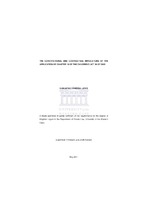The constitutional and contractual implications of the application of chapter 19 of the Children's Act 38 of 2005
Abstract
In this research, I carefully and coherently examine Chapter 19 of the Children's Act 38 of 2005 as the first legislation to afford surrogate motherhood agreements legal recognition in South Africa. I argue that the application of Chapter 19 imposes a number of unwarranted limitations on several of the constitutional rights of the parties to a surrogacy agreement. In addition, I propose that Chapter 19 is not in accordance with the principal of the best interests of the child. I examine the history of surrogate motherhood in South Africa and establish that, prior to the enactment of Chapter 19, no legislation expressly afforded surrogate motherhood agreements legal recognition. Hence, prior to the enactment of Chapter 19, parties who entered surrogacy agreements could, first, not rely on the agreement to enforce contractual obligations, and secondly, the legal positions of the parties to the agreement were uncertain. Thirdly, a child born of a surrogacy agreement was seen as the child of the surrogate mother and not of the commissioning parents.

